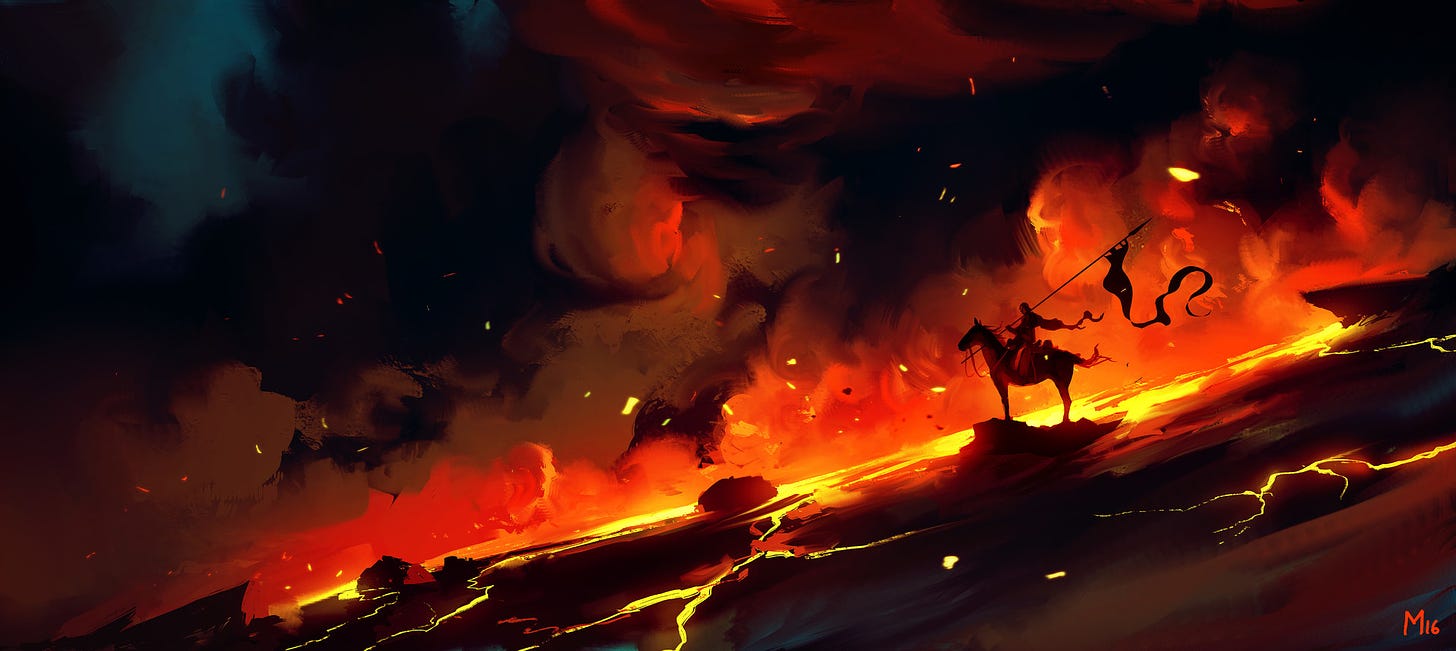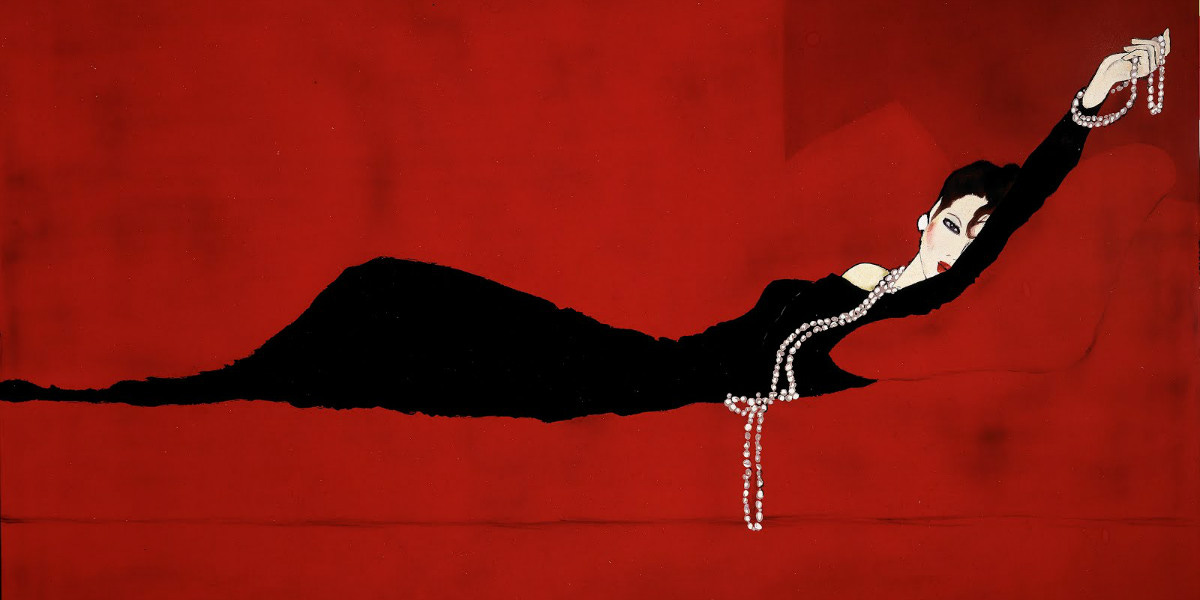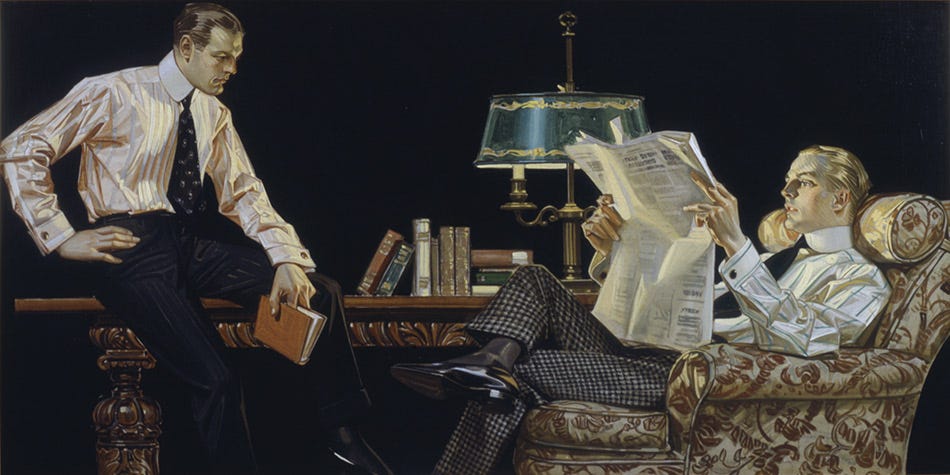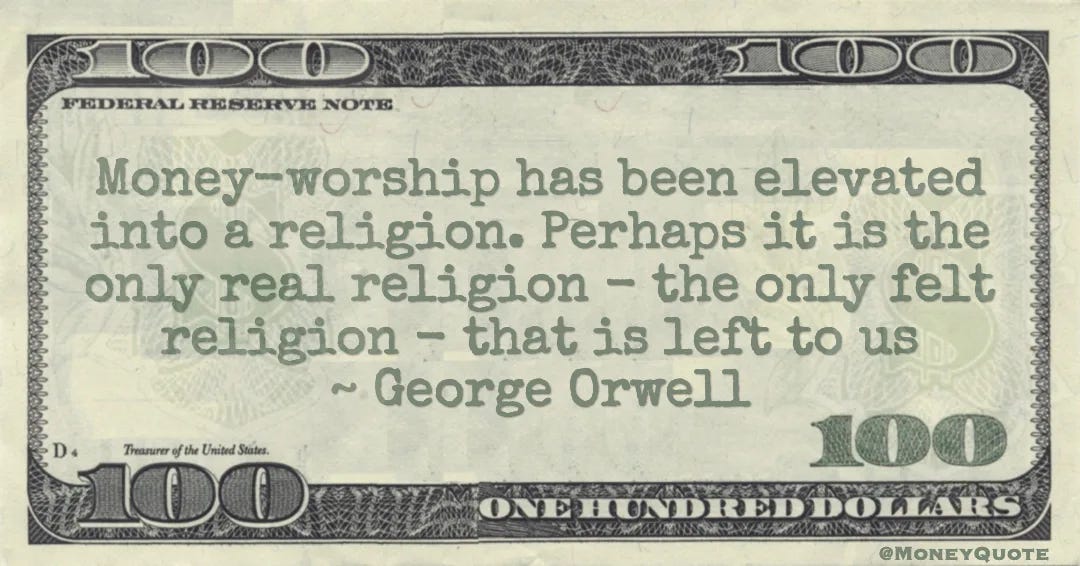"Fate of Empires | The Fall" Part II: How great empires fall into ruin; excellent scholarship and stack by J.S. KASIMIR
Look on my Works, ye Mighty, and despair!
Nothing beside remains. Round the decay
Of that colossal Wreck, boundless and bare
The lone and level sands stretch far away.
― Ozymandias, Percy Shelley
In the first part of this series, we explored the birth and rise of great empires. An underdeveloped nation seizes power from its complacent foes and grows into a dominant force on the world stage. The young nation grows in size as it acquires new resources and lands. Meanwhile, the empire brings distinction and sophistication to itself through scientific and economic expansion. But there are cracks in the foundation, as greed and hedonism spread through the masses. The empire inevitably faces a slow, painful death, as it is torn apart by corrupt politicians, spineless academics, soulless celebrities, and the hopeless masses they control.
With Sir John Glubb’s The Fate of Empires
our guiding source, we will now explore the decline of empires. Like the ascent, this era is defined by three unique ages:theAge of Affluence, the Age of Intellect,andthe Age of Decadence.
The Age of Affluence
Cash rules everything around me
Previous generations provided the empire with immense wealth through conquest, commerce, and the enterprising spirit of the populous. Now, the descendants of those men and women have more money than they know what to do with. This goes for all citizens, including the poor, as wealth—even in proto-capitalist societies—has some sort of trickle-down effect. (How large the wealth gap between the classes, of course, varies depending on the social, economic, and legal structure of a nation.) And while the poor may not be fabulously wealthy, they are still richer—and more hedonistic— than their ancestors.
But it is not economic prosperity that leads to the empire’s downfall. Rather, it is the love of money. The desire for luxury and wealth replaces the desire for honor and adventure. The people grow selfish in their pursuit of wealth. They no longer wish to make money for the sake of their nation, community, or the god(s) they serve. They only want money for themselves alone.
To paraphrase Glubb, the voice of duty is silenced.
The wealthiest citizens flaunt their wealth through extravagant displays such as parties and banquets. Roman banquets infamously involved aristocrats going on a food binge until they vomited—and then continued to eat. Aristocrats were also known for other displays of wealth such as their—*cough*—bacchanals. Displays like these are frivolous and are meant to inspire envy and admiration in onlookers.
Does it work? Of course, it does.
The lower classes are almost desperate to emulate the upper classes and are willing to bend morals and virtues if it means getting closer to the aristocratic lifestyle. As greed, selfishness, and frivolity permeate the upper classes, similar attitudes are adopted by the lower classes. (Ironically, people will still claim they hate the rich.)
As with many things, the youth are most affected by this. Schools no longer teach students about the virtues of honesty, bravery, patriotism, and beauty, but instead how to earn the highest salaries. In the 11000s, Arab writer Ghazali lamented that students no longer attended college to learn virtue or academics, “but to obtain those qualifications which will enable them to grow rich.” The mentality of chasing after meaningless wealth leaves an emotional gap in the youth. This gap will later be filled with pessimism, lust, and vanity as students age into adulthood.
For the American Empire, the Age of Affluence occurred from the 1920s - 1940s.* Just as the Great War affected America’s Age of Commerce and High Noon, the Great Depression disrupted its Age of Affluence. However, some were largely shielded from the effects (i.e., the high-upper class), and continued flaunting their wealth in displays such as Barbra Woolworth Hutton’s debutante ball, (costing over $1m in 2023 dollars
) or basically anything William Randolph Hearst did
. As the United States entered and exited WWII, the nation moved into the next stage of decline: the Age of Intellect.
*Glubb did not set years for America’s decline stages, including its Age of Affluence. In his absence, I have taken the liberty of setting my own dates. If you believe these dates should be altered, feel free to tell me—feedback is greatly appreciated.
The Age of Intellect
During the Age of Intellect, people continue to seek wealth. And what better way to accumulate wealth than by first accumulating knowledge? Students and intellectuals seek academic honors, racing to see who can flaunt their mental abilities the most. Pushed by academic competition, the empire becomes the intellectual leader of the world. New technologies are created and the sciences are greatly advanced. Interestingly, it is the natural sciences that are most greatly advanced during this Age, with new medicines, biological theories, and discoveries taking place.
Colleges become widely accessible during this Age. In the 11th century Seljuk Empire under the reign of Maik Shah, colleges existed in almost every town. This occurred despite the overall political decline of the empire. (During the Age of Intellect, many nations suffer a political and/or military decline.)
Academic achievement is something to be celebrated in any era. However, knowledge is meaningless when it’s pedaled and consumed by the hollow populous. Interestingly, the Age of Intellect quickly deteriorates into a sort of Age of Anti-Intellect when politicians and scholars alike realize academia can be a means of controlling the masses.
For academics, the race for knowledge becomes a race for power. Scholars discredit and degrade themselves for political/financial gain, and become “abject servants” to kings and politicians. In this warped patriotism, the reigning parties use knowledge to sway public discourse, causing mass confusion.
Amid the chaos, the citizens struggle and fail to navigate. Even the academics and politicians lose sight of what’s fact and fiction and they lash out at one another. Debates—once a sign of mature discussion—fall apart, turning into shouting matches between various, misguided parties. In the words of Glubb:
Thus public affairs drift from bad to worse, amid an unceasing cacophony of argument. But this constant dedication to discussion seems to destroy the power of action. Amid a Babel of talk, the ship drifts onto the rocks.
Subscribe
For the United States, the Age of Intellect lasted from the 1950s - 1990s. Again, these numbers are my own. While the US did not lack military prowess initially, it saw an increase in both the number of colleges and enrollment rates.
For a time, academics and scholars had a sort of celebrity status. Carl Sagan, Milton Friedman, Ayn Rand, Thomas Sowell, and many others could be found on various talk shows. Some, including Friedman and Sagan, even had their own television programs. Others published wildly popular books, such as Stephen Hawking’s A Brief History of Time, which remained on the London Sunday Times bestseller’s list for 237 weeks
.
Behind the scenes, however, communism became an increasingly acceptable idea to peddle in the academic world. This only served corrupt scholars and their political masters, who sold the common man twisted dreams of equality (or “equity”) and social well-being. DEI concepts flooded the corporate world throughout the late 80s and 90s, with concepts such as “anti-racism,” “anti-sexism,” “white privilege,” and “allies” becoming terms that would serve to further destroy the fabric of the empire.
Throughout America’s Age of Intellect, climate change and global warming/cooling became the source of disinformation, panic, and parody. The tune has remained the same: the world is gonna end by freezing or melting—it just depends on who’s shouting the loudest. (And those shouting the loudest are always communists.) As time went on, any evidence to disprove climate hysteria was smothered by academic dissidents.
But why does the spirit of the Age quickly deteriorate?
Anti-intellectualism and highly polarized politics, it seems, stem from a culture’s hyper-individualism. The empire is filled with citizens who have been taught to lean into their selfish and narcissistic tendencies. Everyone is taught they and their opinions are “valid”—or “right.” And if everyone is right, no one is. The empire is torn apart through division. And any attempts to have “dialogue” fail. Glubb writes:
Perhaps the most dangerous by-product of the Age of Intellect is the unconscious growth of the idea that the human brain can solve the problems of the world. Even on the low level of practical affairs, this is patently untrue. Any small human activity, the local bowls club or the ladies’ luncheon club, requires for its survival a measure of self-sacrifice and service on the part of the members…The impression that the situation can be saved by mental cleverness, without unselfishness or human self-dedication, can only lead to collapse.
In academia, scholars lose sight of their main goal: to add to the repository of human knowledge. This, inherently, is a service towards humanity. But service is sacrifice. And in the Age of Intellect, the ideals of honor and sacrifice are laughable.
Political tensions become more heightened once the academics weigh in, leading to a mass of polarized citizens who are more concerned with winning arguments than helping their nation survive. The empire grows weaker due to the negligence of its people.
Subscribe
The Age of Decadence
Pessimism, Frivolity, Emptiness
The final age is the Age of Decadence. In the United States, this era spans from the 1990s — present day. (Uh-oh…)
The Age of Decadence is filled with so many problems that initially seem unique to the era. However, the seeds of destruction were sown during the empire’s High Noon, when obnoxious political correctness and a general sense of pessimism took root.
Ultimately, the issues of the Age stem from government and culture, both of which work in tandem, and influence one another for better or worse.
In the realm of politics, government officials become increasingly corrupt. During the Arab decline (800s - 900s), writers noticed the suspicious amount of wealth politicians suddenly gained while in office. Today in America, public officials can legally own stock and gain millions by manipulating the markets by passing legislation that caters to private corporations. Those higher up the ranks sell their influence to corrupt nations and pass legislation that renders the U.S. dependent on totalitarian regimes. Congress is unsurprisingly corrupt, with even our president being tied to laundering.
These politicians were raised during the previous Ages, and have fully adopted the ideals of greed, selfishness, and manipulation. Their corruption impacts the social order drastically. They encourage negative policies, laws, and attitudes that push the empire towards collapse—simply because doing so will line their pockets. Whether or not the politicians actually believe in their destructive policies is irrelevant.
Standard policies and attitudes politicians in the Age of Decadence support include:
Relaxed immigration laws and attitudes toward the unassimilated
Promotion of frivolity
Promotion of destructive feminism
Increased welfare
Decline in religiosity/spirituality
Promotion of complacency
As previously stated, what the government does influences the empire’s culture and vice versa. As the government promotes negative behaviors, the masses—both rich and poor—follow and push the empire further to its end.
Immigration and The Unassimilated
During the empire’s High Noon, imperialism became frowned upon. This attitude only becomes heightened, and peaks during the Age of Decadence. Anything remotely echoing the past in terms of governance on the world stage and towards foreigners is deemed “imperialist.”
The empire’s immigration laws become relaxed. Immigration quotas are thrown out and deemed “regressive.” All the while, foreigners continue to rush to the empire, still viewing it as a beacon of hope and prosperity. With relaxed laws, immigrants flood certain swathes of the nation, mainly urban environments. In the United States, immigration skyrocketed
towards the end of the 20th century, accompanied by increasingly relaxed laws towards illegal aliens.

Due to political correctness, the assimilation of foreigners becomes a taboo subject. (It even becomes politically incorrect to expect foreigners to speak the native tongue.) One could argue that this attitude smacks of subconscious elitism, with the idea that foreigners are too unintelligent to even have the possibility of assimilating properly.
This is a stark contrast to previous Ages, where immigrants were expected to assimilate because it maintained the social order. As assimilation becomes unpopular, the empire finds itself saddled with a new problem: a lack of a unified culture and value system. It’s not that foreign cultures are necessarily inferior, but they may be drastically different. Differences in parenting styles, religion, social expectations, and attitudes toward education can easily lead to division among strangers. It is already difficult when two natives differ in perspective. It only becomes chaos when an entire population differs in perspective.
To those subscribing to political correctness, assimilation is an imperialist vehicle of oppression that scrubs foreigners of everything that is unique. However, there is a stark difference between keeping your foreign birth name and refusing to speak the native tongue entirely.
It is also a misconception that, with assimilation, the empire would ignore the positives of a foreign culture. Cultural appreciation* is the act of adopting traits of another culture to the benefit of the native one. It is a positive act that occurs naturally. However, for the native culture to appreciate, the foreign population must assimilate.
*I refrain from the term “cultural appropriation” to avoid confusion, as it is often viewed through an anti-imperialist lens, and defined as stealing or misrepresenting other cultures. However, this is what I’d call “cultural warping” (e.g., the idea of “two-spirit” being a gender).
Never pushed to assimilate, the immigrant population grows increasingly stubborn. They maintain fierce allegiances to their homeland and resist the native ways of living. (Ironically, they may adopt the negative aspects of the native population, and even cry “imperialism” when they feel slighted.) This can easily disrupt the well-being and safety of the native population, though—due to political correctness—the empire’s natives will rationalize the foreigners’ unproductive behavior as a reaction to oppression.
These attitudes are only heightened if the foreign population was once conquered by the empire. In the United States, we see this in the behavior of Native Americans within reservations—a legally mandated vehicle that prevents assimilation. Never mind the high rates of substance abuse, suicide
, and illiteracy
within reservation territory. If you dare promote the dissolution of reservations, you’re an oppressive, racist, imperialistic colonizer.
Frivolity
As the nation declines in political/military power, unity, and possibly wealth, pessimism and nihilism grow among the citizens. This attitude only expedites the empire’s decline, because no one cares to help save their dying nation.
Confidence and faith are what pushed the empire through the ascension Ages, keeping the empire alive even when faced with extreme threats. Glubb cites the confidence of the Roman Republic, even when faced with “extinction” during moments such as the sack of Rome (390 BCE) and the Battle of Cannae (216 BCE). Even through defeat, it was Roman pride and patriotism that allowed the empire to progress.
However, as the Ages continued, the Roman citizens fell into a state of pessimism. The Romans were no longer taught to be patriotic, selfless, or honorable. Frivolity, vanity, and lust became the means to cope. This led to the mindset Glubb described as:
“Let us eat, drink, and be merry, for tomorrow we die.”
In other words…
This mindset appears in every empire’s Age of Decadence.
The people increasingly distract themselves with mindless entertainment, be it gladiator games or Twitch streams. Anti-intellectualism is at an all-time high and is even reflected in pop culture icons. Celebrities no longer include war heroes, academics, or legendary authors. Rather, they consist almost exclusively of comedians, singers, and athletes.
Sexual morals become increasingly relaxed, as reflected in music. Music of the day becomes extremely vulgar, with lyrics only growing more explicit as the Age continues. During the Arab decline (late 800s - 900s), popular singers were repeatedly banned from Baghdad because of their overtly sexual songs. Of course, they always found a way to return. Today, one can hardly listen to modern artists unless they’re prepared to wash their ears with holy water and bleach afterward.
Feminism
Another defining feature of the Age is the increase in feminism. While it may have not been called such for most of human history, feminist thinking becomes prominent in the Age of Decadence. Traditionalist Romans of the late Republic complained that “although Rome ruled the world, women ruled Rome.”
As feminism shifts social expectations, the workforce sees an influx of women in all professions. During the Arab decline, women occupied a wide range of professions from field laborers to tax-collectors. In the judicial world, there was a push for female judges (read: affirmative action). However, this led to an influx of unqualified judges—which, in turn, led to lawlessness and a collapse in public order.
Let me state that it is unwise for an empire to expect half of its adult population to “stay home,” or to cease working altogether after marriage. That itself is destructive, stifling economic growth and opening the door to dehumanizing norms and abuse. It is feminism that ultimately becomes the problem, as its goal shifts from the social equality of the sexes to female supremacy. Because of political correctness, under-qualified women are allowed into positions that do not suit their abilities. This lowers the average quality of output (e.g., company management, city safety, etc.), and threatens the safety and well-being of the empire. Rather than have training and education standards raised, they are further degraded to allow more unqualified women into once esteemed professions.
But to point this out is apparently misogynistic.
Welfare
Modern welfare as we know it began in the United Kingdom. However, just as feminism reaches back into ancient history, so too does government welfare. It seems that the welfare state’s origins trace as far back as the Roman Empire (the Monarchy, not the Republic).
Welfare is a form of racism and classism. It is the idea that the supreme race/class has the duty to pity and give to those “less fortunate” (i.e., foreigners and the poor). This is preferable to encouraging the lower classes to develop skills that will help them thrive in a free market society.
Under welfare, the government gives and gives with few limitations, and pose welfare as a form of philanthropy. But philanthropy is meant to build people up. The dole, on the other hand, is a totalitarian system meant to hold the lower classes back and treat them like rats in a cage.
Under the name of “social reform” and “welfare,” socialist policies spread throughout the empire. The government claims hold over institutions such as hospitals*, prisons, and mental institutes, which quickly become poorly performing operations due to government corruption and greed. (Hospitals just aren’t aesthetic. But a new palace is!)
*The first public hospital was built in the early 800s under the reign of Harun al-Rashid of the Abbasid Caliphate.
Religious Decline
Throughout the Age of Decadence, people increasingly abandon religion. Regardless of the religion or the god(s) worshiped, all previous Ages had no short supply of the devout. Even wars, such as those during the Age of Conquests, had heavy spiritual overtones. However, religiosity began to erode during the Age of Commerce. As the Ages progressed, the main deities became Money, Wealth, and Luxury. Full dedication to these hollow gods requires selfishness and an abandonment of service to others.
Ironically, citizens begin to grow nostalgic for the days when people were more religious. These Ages were not only more spiritual but were filled with people who were more selfless, sincere, and brave. Few in the Age of Decadence, however, are compelled to adopt such values, because they risk being ostracized by their less virtuous peers.
Complacency
Perhaps the most defining trait of the Age of Decadence is complacency. While this may seem paradoxical to the pessimism many citizens have, it is possible for these traits to coexist. Just look at the United States today: people are arrogant but more depressed than ever before.
At this point, the people believe the empire will last forever—nothing can destroy it! (Except for those blasted imperialists…) The Abbasid Khalifs, the British monarchy, and even the Third Reich believed their empires would last for centuries or even millennia. They believed this even while their nation was falling apart day by day. They believed their eternal reign would be due to the idea that progress is inherent.
This naive arrogance is what speeds the empire towards death. People, having been poorly educated in an anti-intellectual society, believe the laws of economics or history just don’t apply to the empire. This idea is laughable. It gives the nation an excuse to keep ignoring real problems and instead, focus on minor, trivial issues.
What every empire fails to remember is this: Progress is not automatic. It is a machine fueled by sacrifice in blood, sweat, and tears. The prosperity of every empire was built over lifetimes, involving countless souls who dedicated themselves to a higher cause. Without duty and morals, progress stalls and regresses.
Conclusion
“Decadence,” Glubb states, “is a degradation of a system.” As the empire dies, the people become pessimistic and self-destructive, drowning themselves in frivolity and sensuality.
Decadence is a mental, moral, and spiritual disease. And the people know this. They see their empire collapsing. They feel it in their gut. But they are hopeless. Having been raised on lies, the masses believe there is nothing worth saving. “To save the nation is futile,” they say. “It might as well burn.” Bound by mental shackles, the people sit back, watching and waiting for the end to arrive, and for a new, younger country to overtake them.
But why waste away? Is it not our duty to find a solution of our own?
In the third and final part of this series, we will explore how we can reignite the flames of America. We will explore the idea of creating a new Age—one where we may prosper spiritually, economically, militarily, and intellectually: The Age of Heroes.











The fate of everything is death, or a transition to another form. The arrogance of civilizations, governments, cults, deities, cultures and otherwise guarantees their destruction. The US and the western world crumbling is nothing new under the sun.
Ibn Khaldun is worth a mention in this article. He documented many of those trends 1000 years ago.